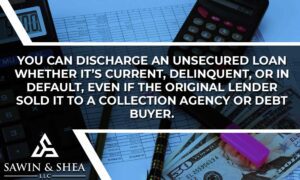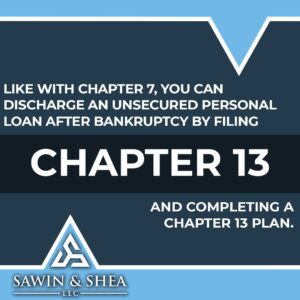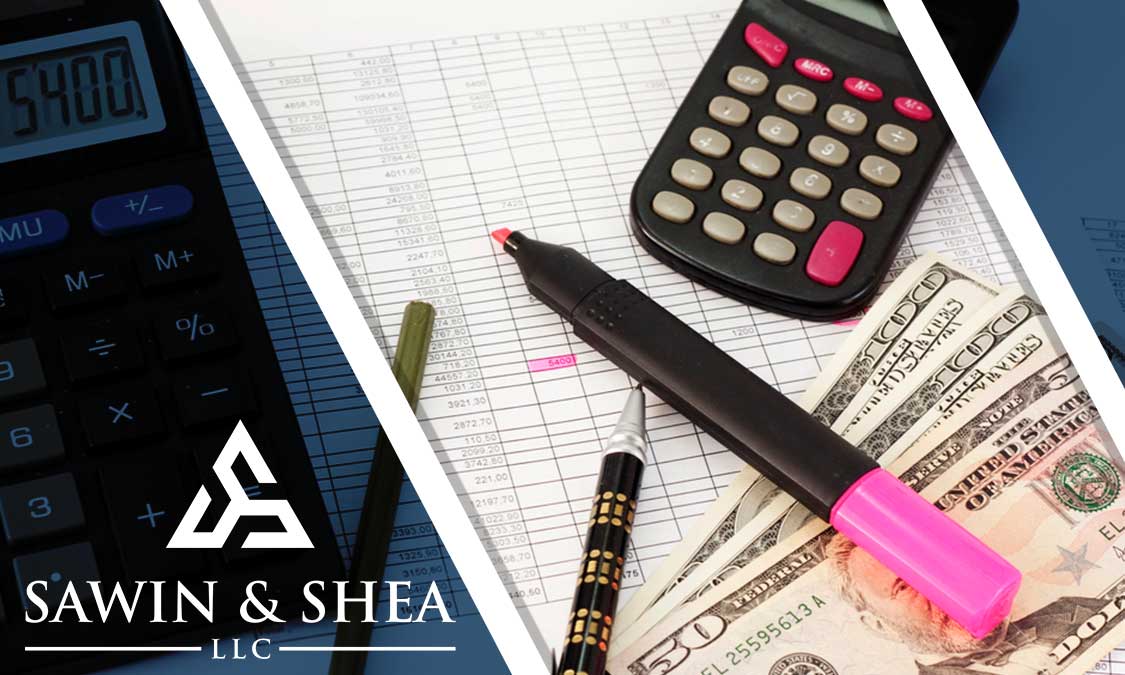When filing for bankruptcy, you can discharge certain types of personal loans, meaning that you’re no longer legally responsible for paying off the debt.
A variety of factors determine if you’ll be able to discharge all of certain personal loans, including whether the loan is secured or unsecured and whether you file via Chapter 7 or Chapter 13 bankruptcy.
If you’re considering filing for bankruptcy, you need to know what personal loans you can discharge and which filing method suits your financial situation. Your bankruptcy case will go much more smoothly if you have a bankruptcy attorney who is familiar with the bankruptcy code on your side.
Types of Personal Loans
According to Business Insider, a personal loan allows you to borrow a specific amount of money via digital or cash deposit for different purposes. The repayment periods are between 1-7 years, although a payday loan may have just a term as short as a few business days or as long as a few weeks.
Types of personal loans include:
- Installment Plan
- Payday
- Peer-to-Peer Lending
- Cosigner/Guarantor
- Debt Consolidation
- Variable Rate
- Fixed Rate
During your bankruptcy proceeding, at least a portion of these loans will be discharged, whether you borrowed from brick-and-mortar or online lenders. If you are filing for Chapter 13, personal loans will be combined with any additional debt and used to calculate your monthly payments.
What’s the Difference Between Secured and Unsecured Personal Loans?
Before choosing your first personal loan, you need to understand the difference between secured and unsecured loans.
Unsecured loans don’t have collateral. If you fail to repay an unsecured personal loan, the lender cannot repossess your assets. Common unsecured loans include:
- Loans from banks or credit unions with no collateral
- Signature & payday loans
- Personal loans from lenders that you know personally
In addition to unsecured personal loans, there are other types of unsecured debts, such as:
- Medical bills
- Repossession deficiency claims
- Old lease balances
- Credit card debt
- Unpaid utility bills
- Some attorney fees
- Dishonored checks
Secured loans involve collateral that the lender can repossess if the borrower fails to make payments.
Discharging Personal Loans Through Chapter 7

Whether you should discharge a personal loan in Chapter 7 will depend on whether the loan is secured or unsecured.
You can discharge an unsecured loan whether it’s current, delinquent, or in default, even if the original lender sold it to a collection agency or debt buyer.
Discharging Personal Loans Through Chapter 13



Like with Chapter 7, you can discharge an unsecured personal loan after bankruptcy by filing Chapter 13 and completing a Chapter 13 plan. The Chapter 13 plan reorganizes your various debts, including personal loans, into a monthly payment plan that lasts three to five years after your filing date.
Unlike Chapter 7, you’ll pay part of the money you owe on unsecured debts, but most Chapter 13 payment plans reduce the total amount you’ll need to pay.
People who are behind on secured personal loans can use Chapter 13 to return to good standing. People often file Chapter 13 to catch up on house or vehicle payments.
Getting a Loan After Filing for Bankruptcy



Bankruptcies can impact your ability to qualify for a new personal loan. A personal finance writer who works with bankruptcies for personal loans is available, but your eligibility will depend on when you filed, how your credit score and history were impacted, your income, and whether the new loan is secured or unsecured.
Chapter 7 will remain on credit reports for ten years and Chapter 13 bankruptcies remain for seven years. Even though it can be more challenging to get a personal loan after bankruptcy is listed on your credit history, you need to apply for loans from lenders who check your credit. No-credit-check lending, such as payday and title loans, often comes with unreasonable fees and annual percentage rates (APR).
When seeking a new personal loan after bankruptcy, use legitimate lenders, such as major financial institutions, credit unions, or through Credit Karma.
FAQs About Personal Loans and Bankruptcies
Here are some commonly asked questions from our clients as they are preparing for bankruptcy court on their way to becoming debt-free.
Which personal loans can be cleared through Chapter 7?
Also called a liquidation bankruptcy, Chapter 7 allows you to discharge most unsecured personal loans, such as credit cards, medical bills, payday loans, personal signature loans, and cash advances. Any unsecured loans you take out after filing can be discharged if you file again.
How will my personal loans be treated under a Chapter 13 bankruptcy filing?
Chapter 13 offers a 3-5-year plan to pay back a portion of your debts via monthly on-time payments. This allows you to keep assets like your home or car while repaying some debt. Unsecured personal loans can be consolidated into your repayment plan at a reduced amount.
What are some other differences between filing Chapter 7 vs Chapter 13 bankruptcies?
Chapter 7 wipes eligible debts completely while Chapter 13 restructures debts into a structured repayment. Chapter 7 has no asset exemptions while Chapter 13 allows exemptions. Chapter 7 stays on your credit report for ten years vs seven years for Chapter 13.
How soon after discharge can I apply for a new personal loan?
You can apply for a new personal loan immediately after your discharge. However, it is difficult to qualify that soon. Experienced lawyers recommend waiting 12-24 months to improve the chances of getting a loan agreement with a lender, whether that is a bank, credit union, credit card company, or any other financial institution.
What are some tips for improving my chances of getting approved for a personal loan after bankruptcy?
Tips include waiting at least 12-24 months after discharge to fill out a new personal loan application, maintaining low credit card balances, paying off as much debt as possible every month, limiting your credit usage, making all payments on time, keeping income stable, having a co-signer, and applying with lenders experienced in post-bankruptcy loans. These actions help filers rebuild their credit scores to have good credit again.
Will I qualify for a secured personal loan more easily than an unsecured loan?
Yes, if you need to get a personal loan after going through bankruptcy, secured loans that require collateral like a car title loan or home equity loan are easier to qualify for post-bankruptcy. Expect higher interest rates as many lenders view you as a risky borrower. Credit reports tell lenders a lot about you, so focus on building good credit.
How does the type of bankruptcy I file impact the wait time to get a new personal loan?
Those who file Chapter 13 typically have an easier time qualifying for new credit because they demonstrate an ability to repay through their loan proceeds. Chapter 7 filers may need to wait longer before their approval odds increase.
Are payday loans or title loans a good idea after bankruptcy? What are the risks?
Payday and title loans are risky because they always charge a high interest rate. For any loan amount of money, their rates can exceed 400%. It’s easy to get trapped in a cycle of renewals while trying to pay for other bills. Nonpayment of title loans can lead to vehicle repossession. Personal loan bankruptcy discharge plans are one of the ways that people escape these predatory cycles.
How can I rebuild my credit to improve my chances of loan approval after bankruptcy?
Getting a secured credit card and making monthly payments can help rebuild your credit. If you need to get a personal loan after bankruptcy, monitor your credit report and dispute any errors. Avoid falling behind on any payment plan, as failing to repay can damage your credit even further. So can a late payment.
You may be able to become an authorized user on someone else’s account, such as a trusted family member. Maintain low balances on credit cards. Making payments on time helps, too!
What documents or information do lenders need when applying for a loan after bankruptcy?
To borrow money, you’ll need ID, such as a driver’s license, proof of income (pay stubs), proof of address, bankruptcy discharge paperwork, a list of assets, bank account info, bank statements, and minimum credit score requirements that are set by the lender. Some lenders may also have additional eligibility requirements.
Can I discharge tax debt through bankruptcy?
Most tax debt cannot be discharged through bankruptcy. However, income tax debts from returns filed more than 3 years ago can potentially be discharged in Chapter 7. Certain other taxes like payroll taxes usually cannot be discharged. Consulting an attorney is recommended for discharging taxes.
Contact Indiana Bankruptcy Attorneys
Don’t go it alone when you’re ready to file — contact bankruptcy lawyers who can assist you with the process of addressing personal loans from before and after bankruptcy and protect you from creditor harassment.
Looking for bankruptcy attorneys in Indiana? Call the legal associates at Sawin & Shea, LLC at 317-759-1483, or you can schedule a FREE consultation online.



